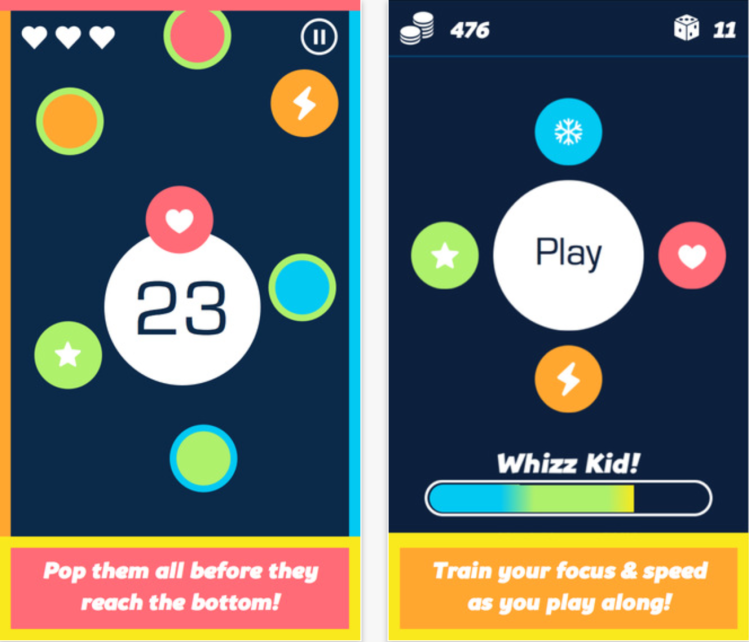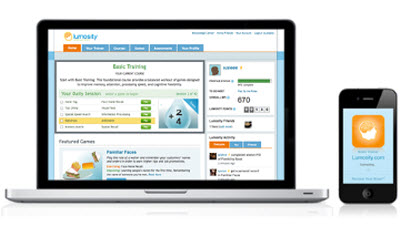One studio hopes to use brain games to raise awareness for a brain disease.
New game developer HomeLabs aims to use brain-training games for mobile devices and related social efforts to raise awareness for Parkinson’s Disease, a progressive nervous system disorder that affects an estimated 10 million people worldwide, says Parkinson’s Disease Foundation. Owner Marc Zovighian plans to donate 50 percent of the studio’s monthly revenues (and all of April’s revenues, for Parkinson’s Awareness Month) to Parkinson’s research, benefitting the Michael J. Fox Foundation. He says that contributing to the disease has been a life-long dream of his, and hopes that his work can help lead to an eventual cure.
The company’s first game, Color Blast, kicks off the effort, and it’s available now on the App Store for $1. It’s based on a cognitive science experiment called the Eriksen Flanker Task, which gauges selective focus and tests a person’s ability to control reactions. The company plans to launch its next game brain game, Flanker, very soon.
GamesBeat spoke with Zovighian last week, and here is an edited transcript of our conversation.
GamesBeat: Can you explain the tie between brain games and Parkinson’s?
Marc Zovighian: It just struck me that creating “brain games” was the perfect opportunity to raise awareness about a brain disease. But more importantly, a gaming movement is also a great way to spread a positive and optimistic message about it. Plus, the goal of brain games is to keep your brain in good shape, right? It’s kind of a way of not taking for granted your cognitive skills. What better way to not take cognitive skills for granted than by doing it in the name of hope for a cure for a disease that affects those same cognitive skills?
GamesBeat: Can you go into why contributing to Parkinson’s research has been a life-long dream?
Marc Zovighian: Circumstances in my life have made me cross path with lots of Parkinson’s patients. It started when I was at school. One of our teacher suffered from it and I had no idea at the time. I remember that I found her strange and thought she was a weird person. One day she sat down with us and told us about it, explaining all the psychologial repercussions and the horrible side-effects of medication that can be as hard to manage as the disease itself. That’s when I understood there was so much more to understand about this person whom I naively found “weird” at the time.
This prompted me to do a lot of research on the matter and meet a lot of other patients, which confirmed my hypothesis that one of the biggest impeding factor to a patient’s will to accept and come out with his disease is social perception. It’s even one of the biggest cause of depression associated to the disease. Very few people fully appreciate the symptoms of PD, which makes it much harder to cope with for PD patients and families of PD patients. If more people were aware, patients would be less prone to denial about their condition and more willing to learn to live with it.
There’s so much to learn about Parkinson’s Disease: identifying early symptoms, grasping the physical and mental repercussions, dealing with side effects of medications, and learning what you can do as a loved one to support a PD patient. This is what I’m hoping to change with this HomeLabs campaign, by sharing facts and educational resources on the HomeLabs social pages.
GamesBeat: So this was the inspiration for this HomeLabs effort?
Marc Zovighian: Every year, during Parkinson’s Awareness Month, hundreds of thousands of people rely on their creativity to raise millions of dollars for Parkinson’s research and I’ve always wanted to be a part of that. That’s when I realised that a “tech world” initiative had never really been done before. You’ll find lots of people organising marathons and usual fundraiser events, but it struck me that there’d never really been a significant gaming initiative before. So that was the main driver behind that.
I also firmly believe that every company should have a parallel social mission. The best and most inspiring example is TOM’S “One for One” campaign. I find it completely amazing! Imagine the world we’d live in if every company has the same model. Ever since I’ve heard about it I thought to myself that my next startup would have a similar model. That’s what I’m trying to achieve with HomeLabs.
GamesBeat: Brain games are complex things, aren’t they? Going in alone doesn’t sound like an easy task. How will you approach this challenge?
Marc Zovighian: I’ve been working on this project since December. It was pretty tough I have to admit. But my motivation drove me. I had just shut down my first startup at the time and this idea is really what helped me get over the heartbreak. Right before we shut down I’d had a few ideas for brain games.
The things is, I’d been interested in the subject for quite some time. I had signed up for other brain training platforms like Lumosity and Peak and had done a lot of research on the cognitive science experiments behind their games. Neuroscience had always been an area of interest so I used to look into that by curiosity. The thing that made it a bit tougher is that I promised myself I wouldn’t copy any game from these platforms. First, because I didnt want to take advantage of something that wasn’t my creation, but second, HomeLabs is not a platform it’s a gaming studio, so I can’t just offer the same kind of “mini-games” as they do. They can do that because their edge is their way of making sense of the data on a neurosciencee level and creating tailored training programs for each user.
So I really had to make an effort on conceptualization to come up with real games and not just mini-games. But the toughest part for me really, was that I had no idea how to develop games ! I had to learn game development and game design by myself. I took some great online courses to learn to use Sketch and Cocos2D and one month later I had my first game ready.
GamesBeat: What will these brain games look like? Color Blast sounds easy at first, but is there more to it?
Marc Zovighian: Color Blast is the first game and it’s a simple high score game. I really tried to do “The Fruit Ninja of Brain Games” for this one. I wanted to reproduce the same behavior of manic swiping( with a few bonuses, but with a bit more brain effort.
The inspiration behind this one is an experiment called the Eriksen Flanker Task which assesses your selective attention and response inhibition. In fact it’s really the color version of that experiment. But like I said before, I can’t just offer mini-games like other platforms, so I added a bit more challenges into the game that also stimulate your flexiblity, speed and even a bit of peripheral vision. It might sound easy but I can assure you the first few rounds are going to get on your nerves.
GamesBeat: What other types of games do you have planned?
Marc Zovighian: The next one is coming out soon. It’s called Flanker and it will be a level game with more than 100 levels. It will challenge your planning and problem solving skills. It’s basically one of those games where you have to reach a goal in a fixed number of steps. I’m really excited about this one. I also have other concepts ready for Memory games and Flexibility games.
GamesBeat: How are you looking to get the word out about these games and your efforts?
Marc Zovighian: I’ve started getting in touch with a lot of Parkinson’s foundations out there and some of them are willing to spread the word about it. Up until now I was mainly using my entrepreneurship networks from my previous startup, as well as alumni networks. The #parkinsonsAwarenessMonth has helped a lot with respect to that. I’m also reaching out to influential individuals hoping that they’ll want to be part of this movement. Nothing confirmed yet but we’re getting there.
VentureBeat's mission is to be a digital town square for technical decision-makers to gain knowledge about transformative enterprise technology and transact. Learn More



